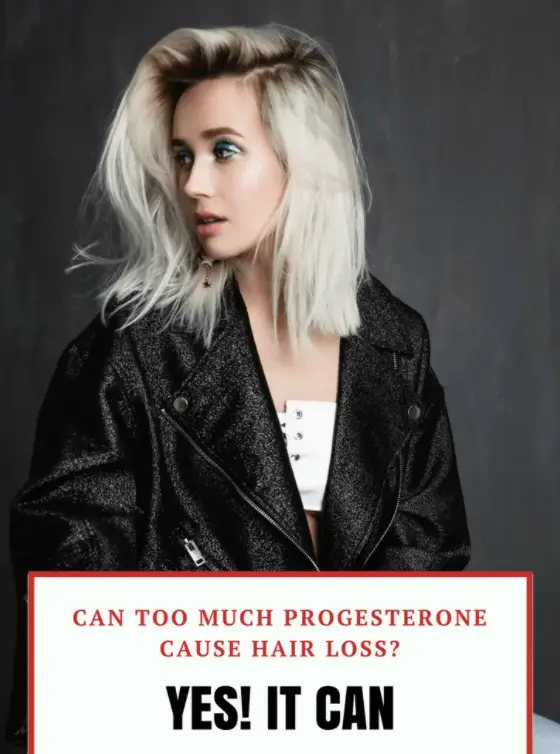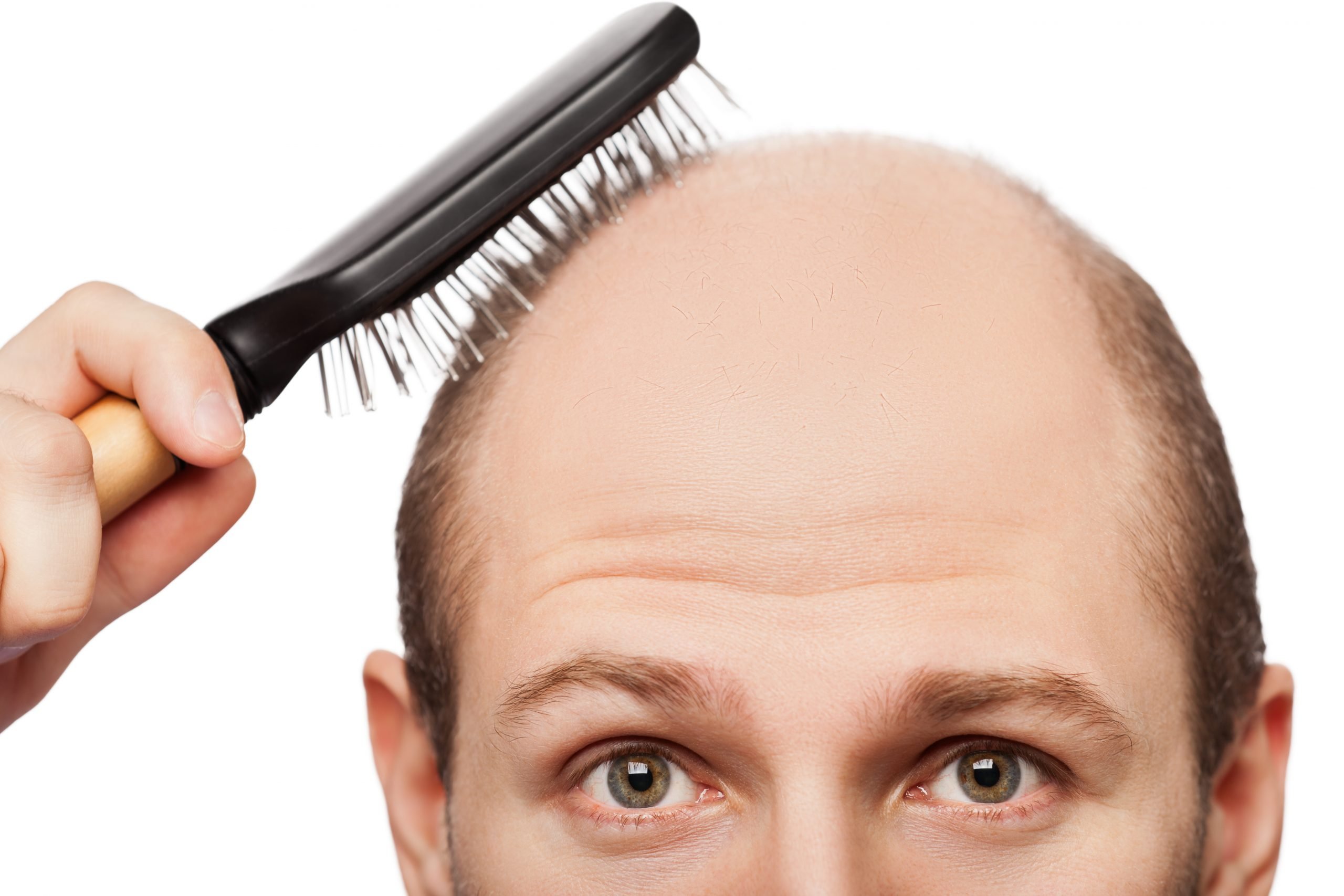
Page Contents
Can too much cause ?
In the past, we have been bombarded with this question. Most people tend to believe that does cause ; however, the answer is not that simple.
In this post, we let’s take a look at and determine if too much can cause .
To start, let’s define so we can truly understand the matter at hand.
What is Hair Loss?

However, permanent takes place when the body is unable to replace the hair that is lost; therefore, you hair beings to thin or bald completely. This is often referred to as androgenic alopecia.
Unusual can result from several causes including medication, stress (), sleeping disorder and , , or high level of .
High Testosterone And Hair Loss
You might also be asking the question: Does high cause ?
According to Lara Briden, , insulin resistance, and PCOS are responsible for . The post reveals that the aforementioned can adversely cause as well as in men and even in women.
Furthermore, a study by the National Institutes of Health (NIH) shows that:
comes from hair follicles shrinkage and the resulting impact of the growth cycle. A high level of free in the body leads to some of the hormones being converted by an enzyme (5-alpha-reductase) into Dihydrotestosterone (DHT).
DHT’s action combines with the sensitivity of the hair follicles to cause . However, it must be noted that or DHT alone does not cause . There is a genetic link attached.
Askmen concluded by saying that only those who are genetically predisposed to male pattern would develop whether there is an increase or reduction in levels.
Also read: Can Progesterone Cream Cause Hair Loss?
Estrogen Encourages Hair Growth
Some persons have also tried to lay the blame for hair loss at the doorsteps of estrogen, but Hairsentinel explains the functions of estrogen to include the following:
- Reduces body hair
- Increases the hair growth on the head
- Decreases muscle mass
- Regulates menstrual cycles and prevents
- It promotes smooth skin, etc.
Progesterone And Hair Loss
Progesterone is a sex hormone that is secreted by the female reproductive system. It is mostly secreted in the ovaries during the second week of the menstrual cycle.
It plays a significant role in everyone’s health. It helps to regulate the female menstrual cycle and can also correct physiological changes associated with the menstrual cycle.
Be sure to also read: These Are The 11 Primary Causes of Hair Loss in Young Females
Does Progesterone Cause Hair Loss?
Ordinarily, progesterone serves as a precursor in the production of other crucial hormones like cortisone and estrogen. Progesterone hinders an enzyme, 5-alpha reductase.
It equally stops the conversion of testosterone to dihydrotestosterone or DHT, which is biologically active metabolite found in the body. DHT is known to cause hair loss because of the role it plays in damaging hair follicles.
Progesterone is a natural blocker against androgen receptor. Its main work is to protect the hair follicle from the effects of testosterone. It is the hormone responsible for more hair growth in women during pregnancy.
In women, regular ovulation is believed to stimulate the secretion of more progesterone. But some conditions like PCOS, stress, and pills can reduce or prevent progesterone production. Stress can even make the body to convert progesterone into cortisol.
Estrogen Deficiency, A Possible Cause
Hair follicles have a special affinity for estrogen. So, if there is a lack of estrogen, the hair would most likely suffer some losses.
In women, there could be vaginal dryness and scanty light periods. They are said to be caused by some factors like an eating disorder, low body weight, low-carb diet, stress, smoking, and gluten intolerance. Don’t forget that the often causes .
But when the underlying cause is corrected, the estrogen level returns to normal, and the situation improves.
How Too Much Progesterone Causes Hair Loss

The best way to explain that correctly is that it can actually cause it. Here’s the explanation.
When you are treating estrogen or progesterone deficiency, you must use natural progesterone to correct the problem. However, it must be used with caution because the excessive application of progesterone tends to lead to hair loss.
How does this happen? When the hair follicle is exposed to excessive progesterone, it shuts down and stops responding. You only need small doses of progesterone, thyroid hormone, and estrogen to take care of the problem.
However, one good way to solve the problem is to return to normal ovulation instead of depending on pills or other medications.
When you are tempted to add more to the number of hormones you are already taking, then you really need to reduce it at that point. If you are not sure what to do, you have to see the doctor for further directives.
Too Much Progesterone and Hair Loss | Conclusion
Though progesterone is employed in the correction of hair loss, care must be taken while using it, as excessive use of the hormone has the power to cause more hair loss instead of correcting the problem.
It’s also good to always consult your doctor to seek professional advice about your hair loss problem.







The problem is something that too few folks are speaking intelligently about. I’m very happy that I found this during my hunt for something concerning this.
Glad you like the post Chris, thanks
Hi Sarah
I saw your site hairlossgeeks.com.
Well I can bet you are a lot younger than me, I am 55 and have been having trouble with Hairloss since I stopped taking birth control pills about 5 yrs ago. My hair has never been the same and I have tried to supplement with HRT and vitamins and nothing seems to really help. I wonder what advice you can give me and what worked for you.
Thanks Linda
Hi Linda,
Thanks for stopping by, have you tried consulting with a dermatologist before? I think that should be the first step.
My derm prescribed compounded 10% minoxidil + 0.1% progesterone. Used as directed, it’s 1mL twice daily. Hair growth was happening for me until my family suddenly decided to sell our house. I was devastated and terrified about my future housing situation. As the months went by searching for housing my hair slowly but steadily began falling out. Eventually, I thought that using more of this solution per session would help. But it just kept getting worse. Now that I own an affordable co-op (without a mortgage), my stress level is much less. But the hair loss is worse. I’ve still been using almost twice the prescribed dose. After reading this article on the dangers of excessive progesterone, I will follow my doctor’s instructions exactly. I just hope it grows back whatever the reason. I look so horrible.
So sorry to hear that Raf, just try and follow your doctor’s instructions as you said, I’m pretty sure your hairs will grow back. Please let me know how it goes.
[…] What do you understand as hair loss and Alopecia? […]
[…] Furthermore, progesterone is a natural steroid hormone that is seen in much greater concentrations in women than men. […]
[…] Recommended Reading: Can Too Much Progesterone Cause Hair Loss? […]
I’m 58 and post-menopausal. Six months ago I was put on Aygestin to control post menopause bleeding. I’ve noticed that I’m losing a vast amount of hair and I wonder if it related.